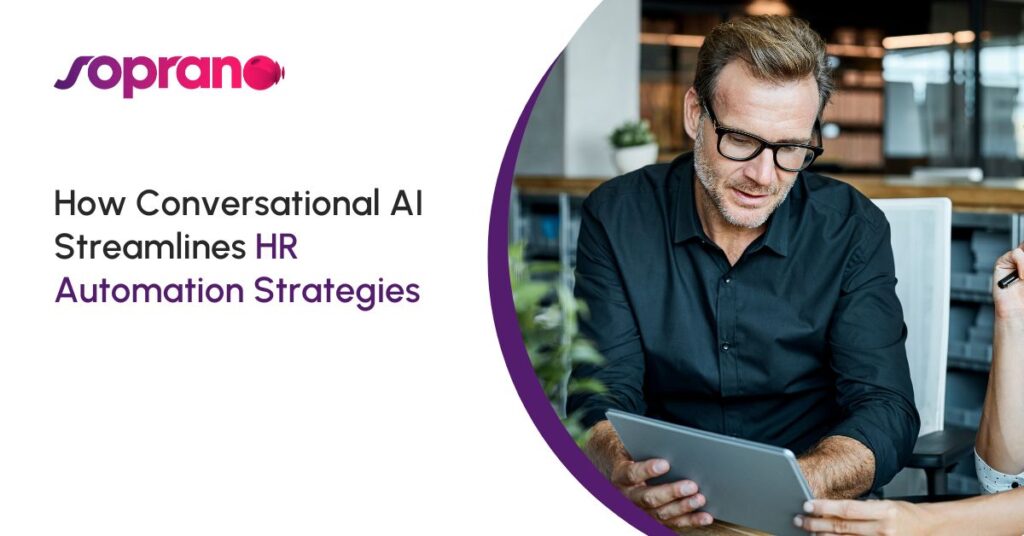
Human resource (HR) automation has been gaining momentum in recent years. Automation can save time and reduce errors, allowing HR personnel to focus on higher-level tasks such as employee engagement and retention. However, Conversational AI has taken HR automation to the next level by providing employees with a more efficient and personalised experience.
In this article, we will explore the impact of these technologies on HR automation strategies and discuss the benefits across the entire employee lifecycle, from recruitment and onboarding to performance management and employee support.
What is HR Automation?
As the world rapidly evolves and technology advances, businesses are under increasing pressure to adapt to a fast-paced and ever-changing workforce landscape.
Traditional HR processes are often time-consuming and labour-intensive, requiring manual intervention and extensive paperwork. HR departments are rising to the challenge by implementing AI and automation technologies.
HR automation is the use of technology to streamline HR processes, such as hiring, onboarding, benefits administration, and performance management. Automation can reduce manual labour, increase efficiency, and minimize errors.
According to Gartner, 56% of companies using AI for HR are trying to automate repetitive tasks. For example, automated HR software can scan resumes, schedule interviews, and send offer letters, freeing HR personnel to focus on more strategic initiatives.
Why Conversational AI improves automation in HR?
Conversational AI, powered by natural language processing (NLP) and machine learning (ML) algorithms, enables intelligent virtual assistants and chatbots to understand and engage with users in human-like conversations.
Conversational AI takes HR automation further by answering frequently asked questions, guiding employees through HR processes, and providing real-time support.
This technology saves employees time and provides a more seamless experience, ultimately increasing employee satisfaction and engagement.
5 Benefits of Conversational AI in HR Automation
- Improved employee experience: Conversational AI provides a more personalised and efficient employee experience, increasing satisfaction and engagement.
- Time savings: Conversational AI can automate repetitive tasks, freeing up HR personnel to focus on more strategic initiatives.
- Reduced errors: Conversational AI can reduce errors and improve accuracy, leading to a more streamlined and efficient HR process.
- Data collection: Conversational AI can collect data on employee interactions, providing valuable insights for HR personnel to make data-driven decisions.
- Scalability: Conversational AI can handle a large volume of employee enquiries, making it a scalable solution for HR automation.
Use Cases for Conversational AI in HR Automation
Onboarding
HR chatbots can guide new employees through onboarding, answering questions and providing support along the way. This can reduce the time and resources needed for HR personnel to onboard new employees and increase new employees’ engagement and satisfaction. Brandon Hall Group says great employee onboarding can improve employee retention by 82%.
Benefits administration
Conversational AI can assist employees with selecting and enrolling in benefits, as well as answering questions about coverage and eligibility. According to a survey by Aflac, 60% of workers would accept a job with better benefits, even if the pay was lower. Conversational AI can help improve the benefits enrolment process by providing personalized recommendations based on an employee’s needs and preferences.
Performance management
Conversational AI can provide real-time feedback to employees and help guide them through the performance review process. This can help employees identify areas for improvement and receive support, ultimately leading to increased engagement and productivity. According to a report by Gartner, organisations that implement continuous feedback systems see a 14% increase in employee performance.
Employee engagement
Conversational AI can help improve employee engagement by providing personalised recommendations and answering questions about company culture and values. According to a survey by Gallup, companies with engaged employees have 21% higher profitability. Conversational AI can improve employee engagement by providing real-time feedback, recognising their accomplishments, and providing opportunities for professional development.
Recruitment
Recruitment is one of the key areas that HR automation has transformed. Chatbots and virtual assistants can be used to communicate with candidates, answer their queries and provide feedback. This saves time for recruiters and enables them to focus on more critical tasks, such as interviewing and assessing candidates’ skills and qualifications. According to recent research, most recruiters find AI technology to be particularly helpful in various stages of the candidate recruitment process. For instance, 58% of recruiters reported that AI is most useful for sourcing candidates. Additionally, 56% of respondents highlighted that AI could be particularly beneficial for screening candidates, while 55% of those surveyed found that AI is most helpful in nurturing candidates.
Training and Development
Conversational AI can help HR departments create personalised employee training plans. This can help employees acquire new skills and knowledge while ensuring they are engaged and motivated. Conversational AI can deliver training materials in bite-sized chunks, provide real-time feedback, and track employee progress.
AI and Automation for Omnichannel HR Experiences
As the modern workplace becomes more diverse and geographically dispersed, it’s essential for HR departments to facilitate seamless communication and collaboration across various channels. Conversational AI and automation can play a pivotal role in creating a unified, omnichannel employee experience.
By integrating AI-driven chatbots into different self-serve communication platforms – such as email, messaging apps, intranet portals, and collaboration tools – HR departments can ensure that employees have access to consistent, up-to-date information, resources, and support, in the channel that works best for their personal situation.
This omnichannel approach also enables HR professionals to engage employees in a more personalised and context-aware manner, addressing their needs and preferences more effectively. Furthermore, the insights gathered from these interactions can help HR teams refine their communication strategies and identify opportunities for improvement.
The Road Ahead: Embracing HR Innovation
As Conversational AI and automation technologies continue to evolve and mature, their potential to transform HR processes and drive innovation will only grow. By embracing these cutting-edge solutions, HR departments can not only streamline their operations and improve efficiency but also create a more engaging and supportive workplace for employees.
Want to learn more about the power of Conversational AI and Automation for HR? Please fill out the form below to download our new Whitepaper.

